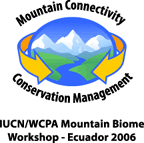MOUNTAIN CONNECTIVITY CONSERVATION MANAGEMENT WORKSHOP
This very successful workshop took place November 14-17th 2006.
Learn more about Connectivity Conservation
Today, a rapidly growing number of plant and animal species are threatened with extinction because of fragmentation and destruction of their natural habitats and the growing impacts of climate change. Now it is becoming crucially important to conserve and re-create physical connections and protected corridors in landscapes around the world. These protected areas will give animals, plants, and Earth's ecological processes the ability escape extinction and destruction by allowing them to migrate successfully from one area to another iin order to survive.
Therefore the concept and practice of Connectivity Conservation has become an important part of environmental protection planning worldwide. But the task of establishing, preserving, and protecting these type of connectivity in today's rapidly developing world is a huge and growing challenge. That is why our global group of mountain experts, the IUCN-WCPA Mountains Biome Network, put together a high-level workshop devoted specifically to the development and promotion of Mountain Connectivity Conservation Management.
The Papallacta Declaration
downloadable Word version (.doc 23k)
"Mountains provide freshwater to more than half of humanity and are major centres of global biological and cultural diversity and sources of inspiration and spirituality...The maintenance and restoration of ecosystem integrity requires landscape-scale conservation. This can be achieved through systems of core protected areas that are functionally linked and buffered in ways that maintain ecosystem processes and allow species to survive and move, thus ensuring that populations are viable and that ecosystems and people are able to adapt to land transformation and climate change...more
Statement from Graeme Worboys, Vice Chair Mountains Biome IUCN-WCPA:
“We have the power to keep the earth’s unfragmented habitats intact in order to ensure the survival of species, the flow of rivers, the protection of water catchments, and the provision of clean air. This is a small but priceless step for the future of our planet and our own wellbeing.”
Purpose of the workshop was:
1. To finalise two years of development of a practical book on conservation connectivity management
(Initiated at the September 2004 International Mountain Corridors Conference, Banff Canada).
2. To analyze and synthesize management lessons learned from at least 8 major global mountain
conservation connectivity initiatives.
Objectives the workshop achieved:
1. To convene a workshop involving experts from around the world who have already developed papers
on mountain conservation connectivity management (for the proposed book).
2. To identify and synthesize lessons learned from managing conservation connectivity.
3. To finalise the nature and scope of the IUCN WCPA publication to be developed.

